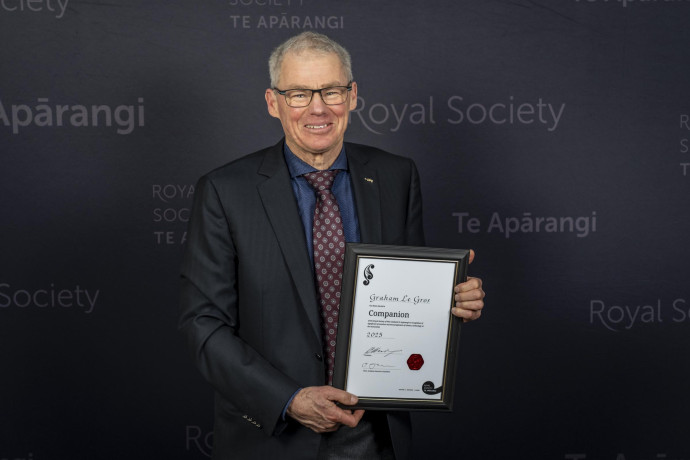News
Published 9 October 2025Harnessing the immune system to provide effective therapies for all

Professor Graham Le Gros CNZM FRSNZ CRSNZ FRCPA (Hon) has been elected as a Companion of the Royal Society Te Apārangi for his leadership in strengthening national capability to deliver innovative biomedical therapies.
Graham was Director of the Malaghan Institute of Medical Research for more than 30 years and built the independent charity into a world-class centre for immunology and clinical trials of new vaccines and other treatments.
He led research programmes in allergic and parasitic diseases to investigate how viral, bacterial, and parasitic infections can inhibit and exacerbate chronic inflammatory diseases such as asthma.
Graham was pivotal in establishing New Zealand's first clinical trials of CAR T-cells, a treatment which trains an individual’s immune system to target cancer cells, offering new hope to people with previously untreatable disease.
He was also a founding director of the Vaccine Alliance Aotearoa New Zealand – Ohu Kaupare Huaketo, driving development of domestic vaccine capability during the COVID-19 pandemic.
"If we can understand the fundamental nature of immune cells, we will be able to create safe and effective therapies to treat diseases for everyone" – Graham Le Gros
Graham says that there is huge potential to harness our immune system to prevent or treat many conditions.
“We are only at the very beginning of being able to use our immune systems to tackle some of the most intractable diseases that can impact our lives.”
Graham believes that many diseases, including neurological and psychological disorders, have links to the immune system and could be prevented or cured with immunity-based therapies.
Futhermore, such therapies could contribute to more equitable healthcare by improving access to treatment.
“The ability to reprogramme or reset our immune system to fight cancer, to prevent allergies or inflammatory diseases so effectively and cheaply means that good health will be democratised.”
“New Zealand has recently experienced how pandemic infectious diseases can threaten our way of life and economy. This threat from constantly evolving infectious organisms to us or our livestock is never going to go away.”
He says New Zealand needs to become more scientifically literate to be less influenced by misinformation and scare tactics. Also, we need to continue to develop the infrastructure and capability to make our own mRNA vaccines.
Graham says New Zealand needs to be “bold and ambitious” in immunology research to “unleash the talents of our young scientists” and build the infrastructure and institutions to do original scientific discovery, develop treatments and deliver them through the health system.
Despite challenges, he has received a great deal of support from many, including donors, scientific colleagues, clinicians, trustees, staff, patients, families, politicians, and government.
“I have been encouraged, motivated and driven, even, by many people in our community from all walks of life who believe in the power of science to do good and change things for the better.”
He says that immunology is a critical discipline for the future.
“If we can understand the fundamental nature of immune cells, we will be able to create safe and effective therapies to treat diseases for everyone.”
